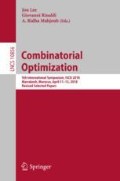Abstract
Dual feasible functions (DFFs) have been used to provide bounds for standard packing problems and valid inequalities for integer optimization problems. In this paper, the connection between general DFFs and a particular family of cut-generating functions is explored. We find the characterization of (restricted/strongly) maximal general DFFs and prove a 2-slope theorem for extreme general DFFs. We show that any restricted maximal general DFF can be well approximated by an extreme general DFF.
The authors gratefully acknowledge partial support from the National Science Foundation through grant DMS-1320051 (M. Köppe). A part of this work was done while the first author (M. Köppe) was visiting the Simons Institute for the Theory of Computing. It was partially supported by the DIMACS/Simons Collaboration on Bridging Continuous and Discrete Optimization through NSF grant CCF-1740425.
Access this chapter
Tax calculation will be finalised at checkout
Purchases are for personal use only
Notes
- 1.
We will use the term “piecewise linear” throughout the paper without explanation. We refer readers to [13] for precise definitions of “piecewise linear” functions in both continuous and discontinuous cases.
- 2.
In this paper, a function name shown in typewriter font is the name of the function in our SageMath program [12]. At the time of writing, the function is available on the feature branch
 Later it will be merged into the
Later it will be merged into the  branch.
branch. - 3.
See the constructor
 .
. - 4.
Interested readers are referred to the function
 in order to check the claimed properties of \(\phi _{s,\delta }\).
in order to check the claimed properties of \(\phi _{s,\delta }\).
References
Alves, C., Clautiaux, F., de Carvalho, J.V., Rietz, J.: Dual-Feasible Functions for Integer Programming and Combinatorial Optimization: Basics, Extensions and Applications. EURO Advanced Tutorials on Operational Research. Springer, Cham (2016). https://doi.org/10.1007/978-3-319-27604-5
Aráoz, J., Evans, L., Gomory, R.E., Johnson, E.L.: Cyclic group and knapsack facets. Math. Program. Series B 96, 377–408 (2003)
Bachem, A., Johnson, E.L., Schrader, R.: A characterization of minimal valid inequalities for mixed integer programs. Oper. Res. Lett. 1(2), 63–66 (1982). http://www.sciencedirect.com/science/article/pii/0167637782900487
Basu, A., Hildebrand, R., Köppe, M.: Equivariant perturbation in Gomory and Johnson’s infinite group problem. I. The one-dimensional case. Math. Oper. Res. 40(1), 105–129 (2014)
Basu, A., Hildebrand, R., Köppe, M.: Light on the infinite group relaxation I: foundations and taxonomy. 4OR 14(1), 1–40 (2016)
Basu, A., Hildebrand, R., Köppe, M.: Light on the infinite group relaxation II: sufficient conditions for extremality, sequences, and algorithms. 4OR 14(2), 107–131 (2016)
Basu, A., Hildebrand, R., Köppe, M., Molinaro, M.: A \((k+1)\)-slope theorem for the \(k\)-dimensional infinite group relaxation. SIAM J. Optim. 23(2), 1021–1040 (2013)
Basu, A., Hildebrand, R., Molinaro, M.: Minimal cut-generating functions are nearly extreme. In: Louveaux, Q., Skutella, M. (eds.) IPCO 2016. LNCS, vol. 9682, pp. 202–213. Springer, Cham (2016). https://doi.org/10.1007/978-3-319-33461-5_17
Blair, C.E.: Minimal inequalities for mixed integer programs. Discrete Math. 24(2), 147–151 (1978). http://www.sciencedirect.com/science/article/pii/0012365X78901930
Gomory, R.E., Johnson, E.L.: Some continuous functions related to corner polyhedra, I. Math. Program. 3, 23–85 (1972). https://doi.org/10.1007/BF01584976
Gomory, R.E., Johnson, E.L.: Some continuous functions related to corner polyhedra, II. Math. Program. 3, 359–389 (1972). https://doi.org/10.1007/BF01585008
Hong, C.Y., Köppe, M., Zhou, Y.: Sage code for the Gomory-Johnson infinite group problem. https://github.com/mkoeppe/cutgeneratingfunctionology. (Version 1.0)
Hong, C.Y., Köppe, M., Zhou, Y.: Equivariant perturbation in Gomory and Johnson’s infinite group problem (V). In: Software for the Continuous and Discontinuous 1-Row Case. Optimization Methods and Software, pp. 1–24 (2017)
Jeroslow, R.G.: Minimal inequalities. Math. Program. 17(1), 1–15 (1979)
Kılınç-Karzan, F., Yang, B.: Sufficient conditions and necessary conditions for the sufficiency of cut-generating functions. Technical report, December 2015. http://www.andrew.cmu.edu/user/fkilinc/files/draft-sufficiency-web.pdf
Köppe, M., Wang, J.: Structure and interpretation of dual-feasible functions. Electron. Notes Discrete Math. 62, 153–158 (2017). LAGOS 2017 - IX Latin and American Algorithms, Graphs and Optimization. http://www.sciencedirect.com/science/article/pii/S1571065317302664
Lueker, G.S.: Bin packing with items uniformly distributed over intervals [a, b]. In: Proceedings of the 24th Annual Symposium on Foundations of Computer Science, SFCS 1983, pp. 289–297. IEEE Computer Society, Washington, DC (1983). https://doi.org/10.1109/SFCS.1983.9
Rietz, J., Alves, C., Carvalho, J., Clautiaux, F.: Computing valid inequalities for general integer programs using an extension of maximal dual feasible functions to negative arguments. In: 1st International Conference on Operations Research and Enterprise Systems-ICORES 2012 (2012)
Rietz, J., Alves, C., de Carvalho, J.M.V., Clautiaux, F.: On the properties of general dual-feasible functions. In: Murgante, B., et al. (eds.) ICCSA 2014. LNCS, vol. 8580, pp. 180–194. Springer, Cham (2014). https://doi.org/10.1007/978-3-319-09129-7_14
Vanderbeck, F.: Exact algorithm for minimising the number of setups in the one-dimensional cutting stock problem. Oper. Res. 48(6), 915–926 (2000)
Yıldız, S., Cornuéjols, G.: Cut-generating functions for integer variables. Math. Oper. Res. 41(4), 1381–1403 (2016). https://doi.org/10.1287/moor.2016.0781
Author information
Authors and Affiliations
Corresponding author
Editor information
Editors and Affiliations
Rights and permissions
Copyright information
© 2018 Springer International Publishing AG, part of Springer Nature
About this paper
Cite this paper
Köppe, M., Wang, J. (2018). Characterization and Approximation of Strong General Dual Feasible Functions. In: Lee, J., Rinaldi, G., Mahjoub, A. (eds) Combinatorial Optimization. ISCO 2018. Lecture Notes in Computer Science(), vol 10856. Springer, Cham. https://doi.org/10.1007/978-3-319-96151-4_23
Download citation
DOI: https://doi.org/10.1007/978-3-319-96151-4_23
Published:
Publisher Name: Springer, Cham
Print ISBN: 978-3-319-96150-7
Online ISBN: 978-3-319-96151-4
eBook Packages: Computer ScienceComputer Science (R0)


 Later it will be merged into the
Later it will be merged into the  branch.
branch. .
. in order to check the claimed properties of
in order to check the claimed properties of